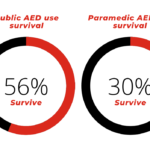Research Reveals Early Warning Signs of Sudden Cardiac Arrest
A recent study has unveiled that approximately half of individuals who suffer from a sudden cardiac arrest may experience specific warning symptoms 24 hours before the onset of this life-threatening event, offering a potential breakthrough in early detection.
The study, published in The Lancet Digital Health journal earlier this week, offers hope in identifying and preventing sudden cardiac arrests before they occur. Researchers, including those affiliated with the Cedars-Sinai Medical Center in the United States, also noted gender-related variations in these warning symptoms.
Among women, the most prevalent symptom preceding a sudden cardiac arrest was shortness of breath, while men more frequently reported chest pain. Additionally, subgroups of both genders mentioned palpitations, seizure-like activity, and flu-like symptoms as precursors to their cardiac arrests.
Sudden cardiac arrest claims the lives of 90 percent of individuals who experience it outside of medical facilities, underscoring the critical need for methods to predict and avert this condition.
Study co-author Sumeet Chugh emphasized the significance of utilizing warning symptoms to identify individuals requiring immediate medical attention, potentially enabling early intervention and the prevention of impending fatalities.
The research involved the analysis of data from two well-established, ongoing community-based studies: the Prediction of Sudden Death in Multi-Ethnic Communities (Presto) Study, initiated eight years ago in Ventura County, California, and the Oregon Sudden Unexpected Death Study (Suds), which commenced 22 years ago in Portland, Oregon.
Researchers evaluated the prevalence of individual symptoms and combinations of symptoms occurring before sudden cardiac arrest in both studies and compared these findings with control groups that also sought emergency medical care.
In the Ventura-based study, it was discovered that 50 percent of the 823 individuals who experienced sudden cardiac arrest—whether witnessed by a bystander or attended to by an emergency medical professional—had exhibited at least one telltale symptom 24 hours prior to the event. Similar results were obtained in the Oregon-based study.
Eduardo Marbán, another author of the study, emphasized the significance of this community-based research, highlighting its assessment of warning symptoms and symptom sets associated with imminent sudden cardiac arrest. This study marks a pioneering effort in evaluating these associations using a comparison group that included symptoms documented by emergency medical services during routine care.
These findings open doors to further research aimed at combining various symptoms with other characteristics of the condition, potentially leading to enhanced prediction and prevention of sudden cardiac arrest.
Dr. Chugh expressed optimism regarding the potential of these sex-specific warning symptoms and suggested that future research would incorporate additional features, such as clinical profiles and biometric measures, to further improve the prediction of sudden cardiac arrest and usher in a new era in its prevention.





